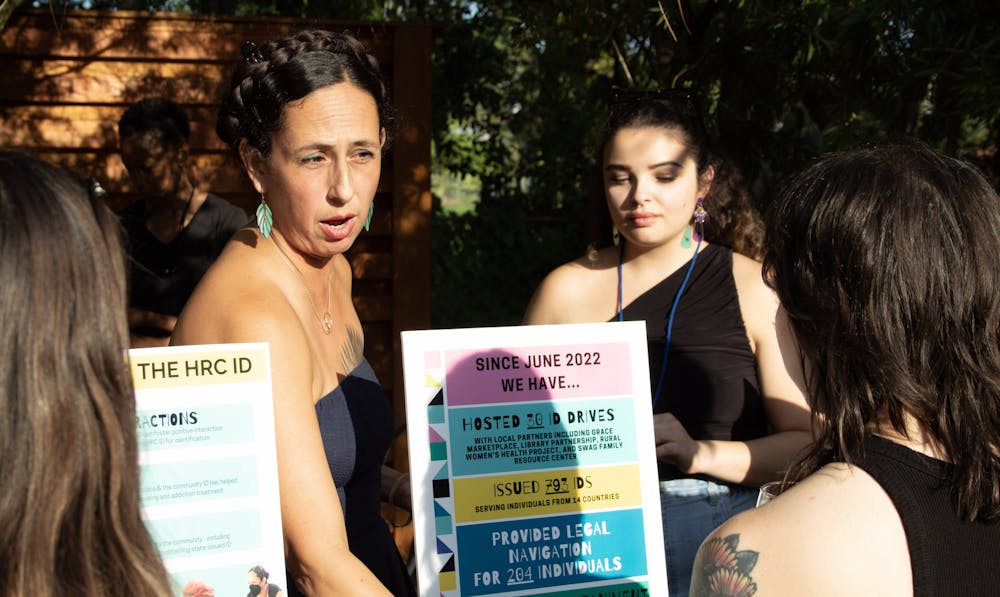Over 60 patrons raised their wine glasses in support of the human right to identification at Superette Wine and Provisions Sept. 15. For the next week, until Sept. 24, part of the sale of each wine glass at Superette Wine and Provisions will support the Human Rights Coalition’s community ID program after its recent funding cuts.
Gov. Ron DeSantis signed Senate Bill 1718 into law in May and it went into effect in July. This legislation strengthened enforcement of immigrant labor identification and cut all county funding for community ID programs. Alongside the coalition's program in Alachua County, programs in Palm Beach, Broward and Miami-Dade counties were also affected.
“Because of the laws that have been passed here in Florida, a lot of the immigrant population are worried about law enforcement [and] being caught,” said Mary Nutter, an 81-year-old HRC volunteer notary.
The community ID is recognized by a number of facilities and can be used in interactions with law enforcement, food banks, hospitals, rent and education.
“As an undocumented worker, you can't do anything without one,” said Jackie Davis, a 67-year-old fundraiser participant. “You can't put your kids in school. You can't get a bank account. You can't rent out an apartment. It’s vital for people to survive.”
After this new immigration legislation, the Human Rights Coalition, which has issued 793 community IDs in the past 14 months, lost $20,000 in grant funding from Alachua County. As a result, it has resorted to community funding like the fundraiser at Superette.
Veronica Robleto, the 43-year-old director of the program, shared the impact of these cuts.
“In general, our organization is kind of underfunded,” Robleto said. “Even the county funding is only for two years, so we are still looking to make the program sustainable.”
Although meant to target the community ID specifically, the implications of this law are much greater, according to Robleto. The HRC hosts programs aside from the community ID, which could also face impacts due to a general lack of funding.
“They'll do accompaniment requests, which [means] going with folks who need a ride to their appointments, whether it be citizenship appointments, immigration appointments, or if it's a doctor's appointment,” said Gracia Hernández, a 28-year-old volunteer.
The HRC also provides legal navigation services, promotes community language access and conducts emergency planning in case of deportation and family separation. In the past year, the HRC provided legal navigation services for 204 people, helped over 55 families with emergency planning and accompanied 30 individuals to various immigration appointments.
The HRC also provides resources such as Red Cards in English, Spanish, Chinese and Thai that inform citizens and noncitizens alike of their Fourth and Fifth Amendment rights in case of an encounter with law enforcement.
As a nonprofit organization, volunteers are the lifeblood of the Human Rights Coalition. Since 2022, they have logged over 500 hours spread across 50 volunteers throughout all its programs.
“What I really love about HRC is that I see people coming back to volunteer with us because they feel good about helping the community,” Robleto said. “I don't have to beg people, they come back and they're like, ‘When can I help you again?’ It’s been really humbling to see that. It makes me feel hopeful for the future.”
The HRC also operates under the Gainesville Immigrant Neighbor Inclusion Initiative, an organization which focuses on making Gainesville a more inclusive community, especially for immigrants. In conjunction with GINI, the HRC has advocated for and confirmed the Gainesville Police Department will release a public service announcement in English and in Spanish regarding how they will operate under the new law.
“Both agencies actually assured us that it didn't really change what they do day to day,” Robleto said. “They're not interested in immigration and Customs Enforcement, that's a federal issue. They're not going to be looking for people who are undocumented.”
The official announcement from GPD has no scheduled date.
Despite the changes prompted by SB 1718, the HRC continues to provide its services to the Alachua County immigrant community with the help of its ongoing fundraiser.
“It's a real, uphill struggle to work with people who are just in a very marginalized place in society,” said Mary Fukuyama, a 75-year-old former volunteer and continued supporter of the HRC. “I'm so pleased that it's still happening.”
Contact Eluney at editor@alligator.org. Follow him on Twitter @Eluney_G






